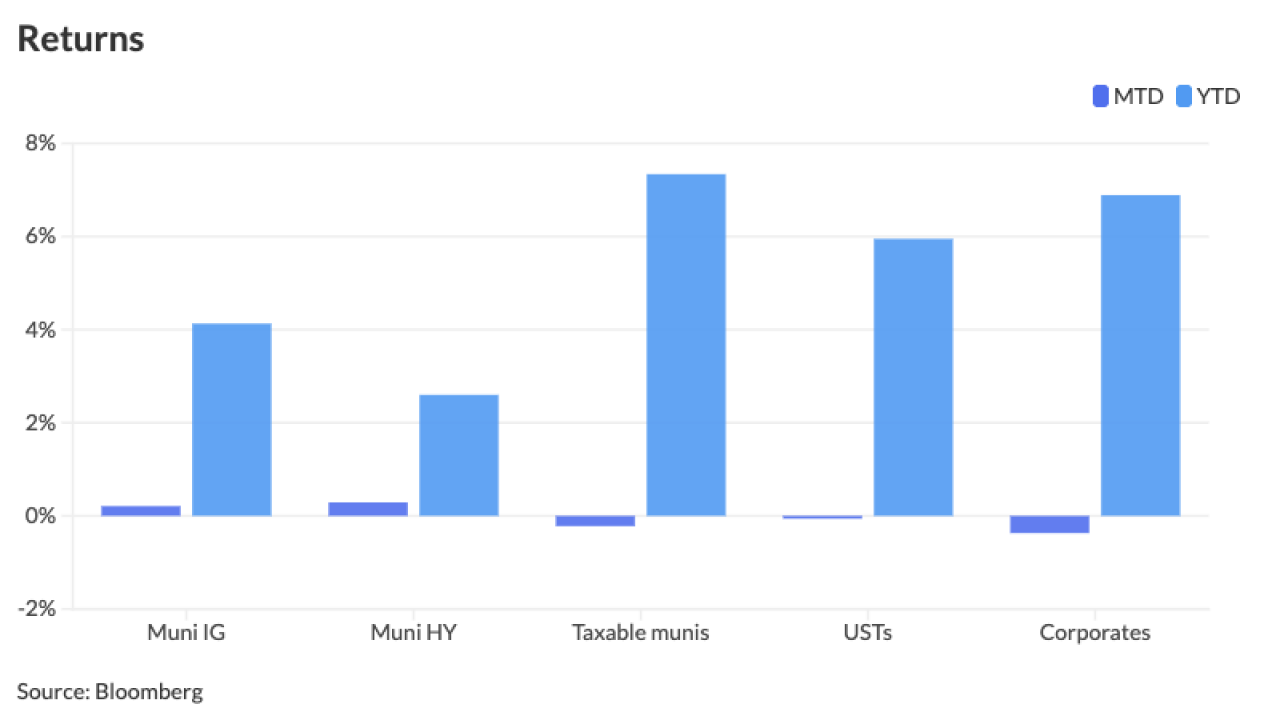
CHICAGO - The Missouri Joint Municipal Electric Utility Commission enters the market today with a $104 million fixed-rate revenue bond sale to wrap up financing for the $1.9 billion Iatan 2 coal-fired plant that will mark the utility's first significant step into the business of generating power.
The deal includes a $101 million tax-exempt piece for construction and a nearly $3 million taxable tranche that will go into an operating reserve fund. JPMorgan is the senior manager, with Goldman, Sachs & Co. and Wachovia Securities rounding out the team of underwriters.
The utility previously has purchased bond insurance from Ambac Assurance Corp. and MBIA Insurance Corp., two major monoline insurers that have lost their top credit ratings.
For this sale, it has received bids from two triple-A rated bond insurers and officials were still considering earlier in the week whether insurance would be a cost-effective move, said Mike Loethen, chief financial officerfor the joint-powers agency.
"We have received bids from insurers, and are looking at the market and what the current appetites of investors are and their preference for the rating alone or [with] insurance," he said. "We have a solid track record and feel confident in our ratings."
Ahead of the sale, Moody's Investors Service affirmed the A3 rating assigned to the utility's debt issued for the Iatan 2 plant and Fitch Ratings affirmed its A rating. Standard & Poor's does not rate the utility.
The JPA issued $182 million in 2006 to provide initial funds for the project, which has grown in cost to $1.9 billion from an original estimate of $1.4 billion in 2006.
The issue represents the final leg of financing for the 850-megawatt, supercritical pulverized coal-fired power plant. The plant is located in Weston, Mo., and the Electric Utility Commission's participation includes an interest in 100 megawatts, or about 12% of the plant's capacity.
The commission is participating in the construction and operation of three coal-fired projects to serve its various member utilities, with the Iatan 2 project and Plum Point plant in Arkansas scheduled to open in the summer of 2010.
While the utility has some generating capacity in the form of wind turbines and from its participation in an ethanol plant project, the opening of the plants will mark its first entrance into the world of utilities that generate their own power.
The Iatan 2 bonds are secured by net revenues of the commission through its take-or-pay power purchase agreements with 34 participating local utilities. Rating analysts considered the credit quality of the participating utilities in their ratings.
The commission has separate agreements with Columbia and Independence, both in Missouri, that require payments regardless of whether the plant operates. The two contracts that run through the life of the bonds account for 70% of the utility's obligation on Iatan 2. The remaining 30% comes from a power pool of 32 participating electric utilities located in Missouri.
Moody's described the contracts as a credit strength, along with the utility's ability to set wholesale rates to recover costs not subject to regulatory review, and Kansas City Power & Light Co.'s role as construction manager. KCP&L also has a 54.7 % ownership interest in the plant.
The JPA's challenges include the demands of managing a growing debt load, owning its first coal-generating facility, and construction risks. The plant's costs also have risen to $2,245 per kilowatt from an original estimate of $1,738, and its opening date has been pushed back by several months.
The general uncertainty over future state or federal regulatory action involving coal-fired plants - including the imposition of new greenhouse gas emission caps - is a credit risk for the commission and the sector in general. Proponents of the project note that the plant is using "supercritical technology" that lowers carbon emissions, but environmental groups still warn that coal plants are heavy polluters and emitters of greenhouse gases that contribute to climate change.
"Missouri has not enacted environmental guidelines or greenhouse gas performance standards; however, reducing greenhouse gas emissions is expected to present future challenges for MJMEUC," Fitch analysts wrote.
The utility also has ownership stakes of 147 megawatts in the $1.4 billion, 665-megawatt Plum Point project and 195 watts in the $2.9 billion, 1,600-megawatt Prairie State Energy Campus in southwestern Illinois. Prairie State is scheduled to begin operating in the summer of 2012.
A total of $829 million of debt was sold so far by the commission to finance its share of those projects, with additional issuance expected later this year and next year.
The Missouri JPA began considering participating in the projects a few years ago, as it sought to seek more stable pricing by entering the power-generation business. The utility turned to generating projects as the most affordable means to meet the growing demands of its participating members by reducing exposure to open-market power purchases.
For instance, the commission and seven other JPAs participating in the Prairie State project, the largest coal plant under construction in the country, have locked in the price for the coal supply for 35 years - the length of time the coal supply that comes from an adjacent coal mine is expected to last.





